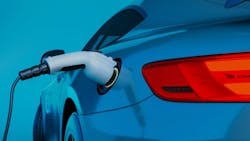EV Maintenance: An Opportunity to Get in on Ground Floor
This coming July will mark the 60th anniversary of Bob Dylan going "electric" at the Newport Folk Festival. It is remembered as being a pivotal moment in rock music, but in reality, electric was the future, even for folk music.
It is hard not to see the automotive world moving in the same direction. It may not be next year, or even the next decade, but we can expect to see more hybrid and electric vehicles (EVs) on the road in the not-too-distant future. For preventative automotive maintenance shops, now is the time to think about going electric as well.
"Electric vehicles aren't going to be the only automobiles on the road, but with all the incentives and the money that the federal government has spent, there is no way it is going to back down," explains John Forro, leader instructor, content developer, and owner of Electron John, which provides EV maintenance training services.
Better to be Proactive Than Reactive
According to 2024 National Renewable Energy Laboratory estimates, there will be 26.4 million to 33 million EVs on U.S. roads by the end of the decade. That number is expected to only grow throughout the 2030s.
It will also pick up speed sooner than expected, with recent data suggesting that by as early as the end of 2025, 20% of new car sales could be EVs. Yet, if those numbers are overly optimistic for the EV market, there are still plenty of opportunities for the shops that can service the vehicles.
"Even if there was never another EV sold, there are already so many on the roads that chances are someone in your customer database is going to require service," Forro tells National Oil & Lube News.
A High-Voltage Business
As the EV market is set to grow, shops may see an opportunity – but should still proceed with literal caution. Not because EVs aren't the future, but because EV maintenance comes with some new challenges, including those that require additional training and investment.
"There is a level of danger with internal combustion engines that has long been understood," says Forro. "Many remain with EVs."
Those dangers have long existed, and technicians are trained to understand and mitigate the risks that come with servicing such vehicles. EVs will bring similar, but different – and certainly no less dangerous – risks.
"There is an added danger of getting electrocuted from the high-voltage batteries," warns Forro. "That will require shops to invest in additional PPE (personal protective equipment)."
Getting into the Business
Expanding to service EVs is something that shops can do slowly, and even then, there are still steps that need to be taken. This includes obtaining the equipment to service the vehicles, and then ensuring the technicians are properly trained, but it does require the investment in the PPE devices.
"The majority of technology in an EV pretty much transfers from car line to car line, but there are some differences," Forro notes.
Just as shop managers and some techs already need to undergo training to service internal combustion engine vehicles, there will likely be continuing education with EVs.
"The training is important so that you can be relevant in this space," says Forro. "But in addition to having the equipment, I can't stress enough the importance of the PPE devices, which ensure a layer of safety when working around high voltage. If you don't have the right equipment and PPE, it handcuffs what you can do and what services you can offer."
A shop that works on EVs will have different PPE devices than one that only services traditional automobiles. In addition to aprons, coveralls, hoods, knee pads, and gloves among other equipment, EVs will require a shop to add arc-rated garments that can withstand an arc flash from intense heat and flames, while shops will need shock protection gear, face shields and even helmets.
PPE shouldn't be the first consideration.
"Start with the training, which can be time-consuming, then go into the PPE, and then the equipment," Forro recommends.
Shops will also need to set up a charging system, which Forro says is a "whole other can of worms," yet it is one any shop servicing EVs will need.
Services to Start With – Balancing the Possibilities
Shops that are entering the EV market can still start out with basics, including servicing the tires and even fluids.
"EVs use specialty tires, which can wear out faster on EVs than on other vehicles," says Forro. "There are still plenty of options for fluids, which should be familiar to those in the quick lube space. There are all sorts of specialty fluids for EVs, but it is important to note they can't have any kind of conductivity. These include the braking fluids and coolants recommended by the manufacturers."
An EV high voltage battery is certainly the largest service potential for a preventative maintenance shop, as these can go out of balance, so understanding how to maintain these could be something shops explore as they get more comfortable.
"A shop that can balance the batteries will set themselves apart from the shop down the road, as balancing will help the car regain lost mileage," Forro explains, while he adds that there are many regulations that people may not be aware of.
That can include testing a battery enclosure to ensure that no debris can enter, to reduce the risk of fire. Anytime a vehicle is in an accident – however minor – the enclosure needs to be tested. Likewise, there are regulations on how batteries are being transported, including if they're in the car. A battery in a car that is being towed must be 40% charged or less, while any battery transported by air can't be more than 20% charged.
Plenty of Opportunity
The next decade could see the most opportunities for a shop to add other EV services, says Forro.
"We can expect the number of EVs to steadily increase, and there is going to be work out there for everyone," he tells NOLN. "Even if there is a shop down the road or next door or offering EV services, there is going to be business for everybody."
About the Author

Peter Suciu
Peter Suciu is Michigan-based writer and NOLN freelance contributor who has contributed to more than four dozen magazines, newspapers and websites. He lives in the land of cars not far from one of Henry Ford's estates.
